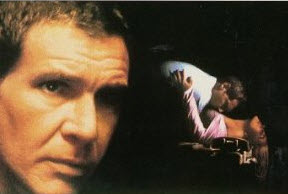Presumed Innocent (1990)

Relevant to this Segment
- You may not appreciate it on first viewing, but this film is all about evidence and investigation. Notice how the legal maneuvering in court has to be firmly supported by facts found during investigation. Notice the scene where the Assistant D.A. Tommy Molto wants to testify about a conversation he had with the defendant (where the defendant stated (sarcastically) something to the effect of, "Sure, I did it." Notice the judge's reasoning for not allowing the testimony. Further, even if the Assistant D.A. had taken the stand, would his testimony as to the defendant's statement have been considered hearsay? Would it have been admissible?
Our thoughts: Rusty's conversation to Assistant D.A. Molto would definitely have been considered hearsay if Molto repeated that conversation on the stand. However, the D.A. could have argued that it was admissible because it most likely fell (in the D.A.'s opinion) under admission or excited utterance.
- Watch for the scene where the judge has to rule on the admissibility of a glass (containing fingerprints) that was obtained by the police but which the prosecution has now lost. The prosecution wants to be able to tell the jury that the glass had the defendant's fingerprints on it but the defense objects since the actual glass has disappeared. Pay close attention to the judge's instructions to the jury on this matter.
Our thoughts: If this case had gone to the jury, and if the defendant had been convicted, this would have been the major point on appeal. To allow the prosecution to describe fingerprints on evidence that no longer exists would just be asking for a case to be overturned on appeal. Remember, the defendant is supposed to have the opportunity to examine all evidence (including testimony and physical evidence). Simply instructing the jury that they "may infer" something negative as to the prosecution's motives is most likely not enough. Also notice how important the objections are regarding this issue. Even after the judge has ruled, the defense attorney should object. This preserves the right to appeal that ruling. If the attorney does not object, he or she loses the right to appeal that issue later.
- There are some great aspects of this movie concerning whether evidence is direct or circumstantial. While we will comment on those aspects at the end of this Segment, ask yourself this. Can a defendant be convicted on circumstantial evidence alone?
Our thoughts: The answer is: Absolutely. In fact, most murders do not take place in front of an audience, therefore most murder trials (and in fact most criminal trials) are basically based upon circumstantial evidence.
Classic Film Recommendation
- Anatomy of a Murder (1959) starring James Stewart.

